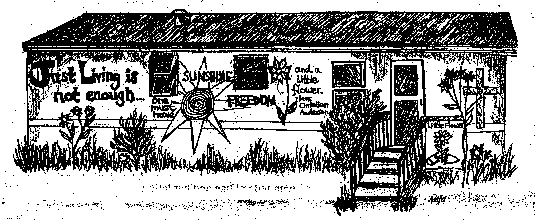


|

|
We sit in the kitchen processing foods from the garden, getting them ready for canning. Our minds process too, the horrible acts of destruction that took place on September 11, the inevitable war to follow and our personal responses to this tender situation. The mundane chore of cutting tomatoes seems almost useless at a time like this, with war imminent and three of our community possibly headed to jail. Yet it's all of a piece - growing food, risking jail, protesting war.
We try to live in a manner that celebrates the humanity and dignity of each person. We recognize the divine quality of all people. We recognize the necessity of acts of love and of life, of respect and reverence for the earth. Ultimately, we recognize our need to follow the teachings of Jesus.
Morning prayer each day allows us to process all this. Over the summer we dug deeply into the stuff of life - questioning how to live humanly, justly, in this American Empire. We focused on the Parables and their radical and often misinterpreted messages. We discussed the idea of finding hope in the midst of our pain, entering into the pain, understanding it. And we constantly examined how to exist outside of the culture, creating our own counter culture based on these Christian and humane ideals.
This leads to exploring ways to grow more of our own food,
how we can buy less. We compost our waste. We save our rain water.
We plant seeds, water them, weed, and harvest the finished product.
We get our hands dirty in the ground and feel the connection of all
life. We come from the earth, and it is there to which we shall
return. We are in awe of the beauty of the earth and the night sky.
It is impossible to stare at that miraculous blanket of stars and not
be thankful that it is visible to us, while so many do not see it at
all.

So we host children from the inner cities of Richmond and Washington, D.C. It is amazing to see their awe when they look up at that very sky, whose stars they cannot see in their city homes. It is hard to see the girls from Richmond react with fear to the bees and bugs, when at home they have witnessed a man being shot to death, and continue to hear gunshots regularly. We rejoice with them at the miracle of making sweet tea from a handful of leaves and finding a stash of snake eggs in the mulch pile.
The harsh realities of our young city friends demand that we act on their behalf. So we have joined Food Not Bombs, Richmond in supporting Parents for Life, a group of parents from a predominantly African-American neighborhood in Richmond, whose children's schools were built atop landfills. In the interest of the children's health, these parents are demanding that these schools be closed and their children given a learning environment free of deadly toxins.
It is because of kids like these, all around the world, that we took part in an action at the Pentagon on August 9th, the anniversary of the atomic bombing of Nagasaki, Japan. Rose Harper-Winder, Michele Naar-Obed, M.J. Parks and ourselves walked up to the building and through a door labeled "Enter Here."
Our desire was to speak to Secretary of Defense Donald Rumsfeld, to bring a message of peace from the children of our cities, of Colombia, Iraq and Palestine. It was an act of love in which we - unarmed - confronted head on, in an attempt to disarm, this global center of death, destruction and war-making. It was our fervent hope that we could persuade Mr. Rumsfeld that war is hurtful to the children of the world. We hung pictures of children, mostly from Iraq and Colombia, on the wall of the building.
Our demand to speak with Rumsfeld was ignored and we were arrested, along with Brandon and three others who held banners outside. We will go to court in October on a charge that carries six months. Given the current state of the world, we are preparing for time. We are preparing, too, to give an account of the hope that is in us - a hope that led us to the Pentagon, that real and symbolic center of warmaking. Perhaps we will get the opportunity to tell the Judge about canning tomatoes, about the lives of inner city children and Iraqi children and Colombian children. About how Jesus was crucified for speaking truth to power, and the gospel call to lay down our own lives for others. Maybe we will be able to say that we went to the Pentagon in an act of nonviolent love, as opposed to a violent act of despair. To beg the warmakers to turn away from policies that create death, hunger and a cycle of terrorism - just as peacemakers have been saying at that building for the last 20 years.
We may be dismissed, we may go to jail. Either way, when we get home, we will tend the garden, dump the compost buckets, teach the children, serve our food on the streets. We will continue to create a nonviolent alternative and to confront the systemic injustices that lead, inevitably, to more and more violence.
[Editors' note: Charges were later dismissed against all of the protesters arrested at the Pentagon in August.]
